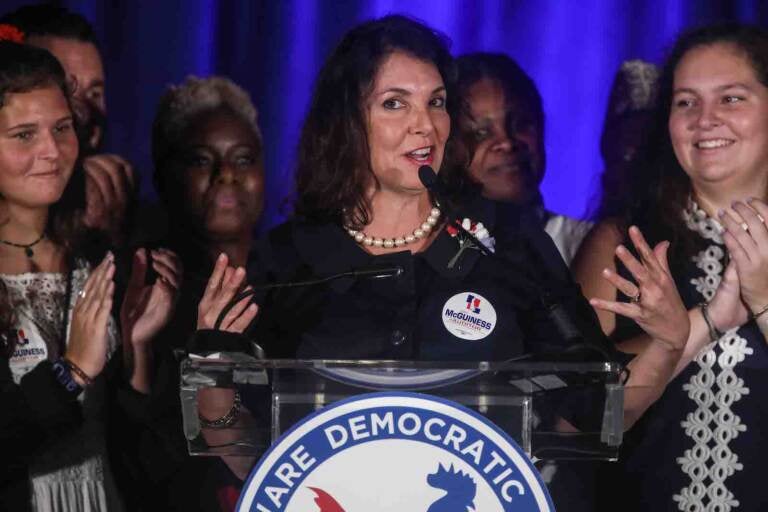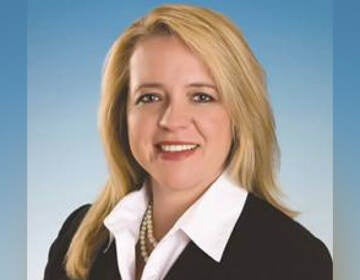$550-an-hour hired gun or public defender? How will taxpayers foot legal bill for indicted Delaware auditor
Kathy McGuiness wants an expensive former top prosecutor to defend her against public corruption charges at state expense. The state calls her request “absurd.”

In this 2018 file photo, Delaware State Auditor Kathleen McGuiness addresses supporters during a Democrat Watch Party at the Doubletree Hotel in Wilmington, Delaware. (Saquan Stimpson for WHYY)
Indicted last week for alleged felony abuse of office, Delaware’s elected auditor wants taxpayers to foot the bill for her $550-an-hour private attorney.
But prosecutors are crying foul. They say state law only entitles auditor Kathy McGuiness to a public defender, or at most a private attorney paid far less — $100 an hour.
They say the former pharmacy owner is “independently wealthy” and can afford to pay for her own defense if she’s not satisfied with what the state permits. In court papers, prosecutors note that McGuiness now wants the public to pay excessive fees to defend herself against allegations of “misusing the public funds she was elected to protect.”
Chief Deputy Attorney General Alexander S. Mackler wrote that “compensating a wealthy defendant’s law firm by several times the court’s standard fees would metastasize the statutory entitlement into something absurd.”
In a case that could take months to resolve and involve a lengthy trial and even appeals, the fees Wood is seeking could easily surpass $100,000.
In the coming days, Superior Court President Judge Jan Jurden will decide the latest dispute in a case that is seemingly becoming more contentious by the day. The legal battle pits McGuiness against Attorney General Kathy Jennings — two first-term Democrats some political observers consider possible candidates for the party’s gubernatorial nomination in 2024.
McGuiness has already accused Jennings in a court motion of violating her right to a fair trial by proclaiming publicly that McGuiness would not speak with prosecutors during the investigation. The attorney general has yet to respond to that allegation and her rival’s call for sanctions.
McGuiness is charged with two felonies and three misdemeanors for allegedly hiring her college-student daughter to a no-show job, giving her 2018 campaign consulting firm an illegal state contract, and intimidating employees who complained. If convicted of all counts, she faces zero to 13 years in prison.
Now she and Jennings are battling over whether the public should foot the hefty defense fee McGuiness is seeking for her lawyer, former high-ranking prosecutor Steven P. Wood, and others in his firm, McCarter & English.
When state agencies and officials are embroiled in legal issues stemming from their public duties, state law stipulates that they are entitled to a taxpayer-funded defense.
The Attorney General’s Office is the default agency to represent officials but because this is a criminal case being brought by Jennings’ office, a conflict exists.
Hence the need exists for outside counsel. Wood’s motion for his fees points to a Delaware Supreme Court rule that says in the event of such a conflict, state officials or employees can “petition for appointment of counsel” by a private attorney.
Wood was hired in early September, and wants he and his firm to be “compensated at a rate which is ordinary and usual for comparable cases in this jurisdiction.”
Wood wrote that his “standard billing rate is currently $650 an hour,” but that he and fellow partners who work on the case would charge taxpayers $550.
He also proposed paying associates in the firm up to $425 an hour, depending on their standard rate, and paralegals up to $325 an hour.
Wood pointed out that McGuiness is currently paying “somewhat” less than the $550 an hour he wants from taxpayers but pointed out that the unspecified rate was negotiated before she was indicted.
And while he pointed out that McGuiness has “limited resources” from which to pay him, Mackler countered for the state that she is “independently wealthy by any standard.’’
Her state salary is $112,000. The pharmacist and entrepreneur who also owned a boot business loaned $75,000 to her 2018 campaign for auditor, Mackler wrote.
Mackler also estimated that the home McGuiness owns in Rehoboth Beach is “estimated to be worth between $2.2 million and $3.7 million.”
Her relative affluence aside, Mackler wrote that state law nevertheless does grant a public official such as McGuiness the right to a taxpayer-funded defense — but only to an extent. He wrote that her right to a taxpayer-funded defense only extends to the Office of Defense Services, also known as the Public Defender’s Office, which represents indigent clients.
The state knows of no such conflict that would preclude Jurden from appointing a public defender to represent McGuiness, Mackler wrote.
But should the judge decide that a public defender should not represent McGuiness, Mackler wrote that the state typically pays only $100 an hour for private attorneys in Superior Court cases when it’s deemed that a conflict exists with the Office of Defense Services.
Mackler concluded: “It is sadly consistent with the defendant’s charged conduct that she would demand the taxpayers spend extra money when the law clearly commands a less profligate alternative.”

Show your support for local public media
WHYY is your source for fact-based, in-depth journalism and information. As a nonprofit organization, we rely on financial support from readers like you. Please give today.







